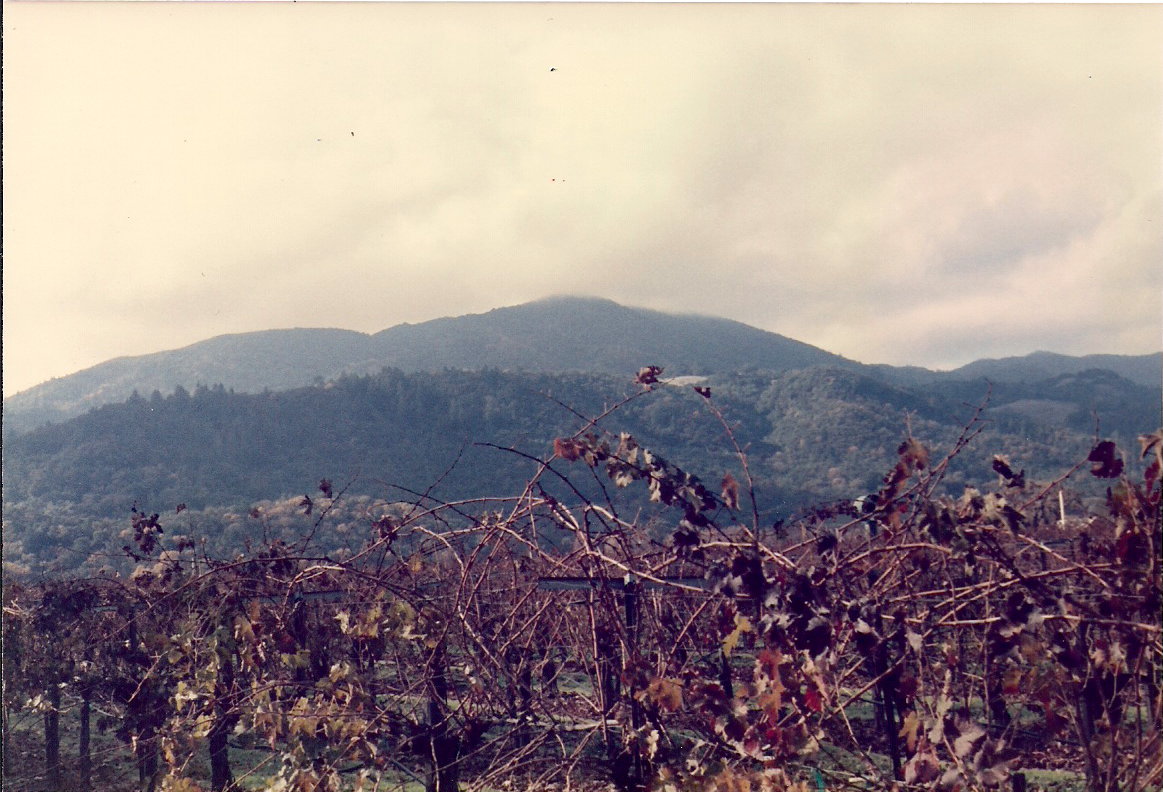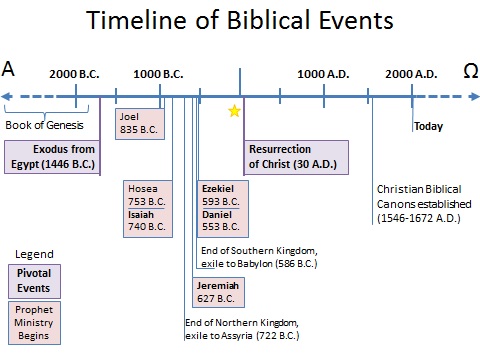

Introduction to the Book of Joel
and Study of Joel 1-3
September 17th
The book of Joel is the second of the minor prophet books. The author uses the context of a locust plague to highlight how quickly our lives can change and to emphasize the ever-present role of God, who one day will bring a disaster even greater than this.
It's not clear when Joel's ministry took place, but his message could fit in any of the generations we have read about. Joel's message certainly applies today because he speaks and writes to warn the people who have ignored God so that they will repent before it's too late. Some experts place Joel's life and ministry in the ninth century B.C. around the same time as Elisha, and before the other prophets whose books appear in the latter part of the Old Testament, as shown below:

Joel's name carries significance. Any Hebrew name ending in “el” has the word God in it because “el” is an abbreviation for Elohim (אֱלֹהִ֔ים), one of the Hebrew names for God.
For example, consider some of the other prophets’ names: Ezekiel means "God strengthens" and Daniel means "justice from God" or "God is my judge." The name Joel means the "LORD (or YAHWEH) is God," which is appropriate for this prophet because he reminds us of this fact. The prophet Joel wrote about the tremendous destructive power and the unlimited forgiving power that is wielded by the LORD, who is God.
Joel is a brief book that we will complete in one day – but it’s not the shortest one in the Bible. References used in this study include the following books:
Please refer to one or more Bible versions of your choice to read this section. We recommend that you read at least two versions for added understanding. For your convenience, we have provided six links below, each of which takes you directly to today's chapters in a specific version:
Bible Gateway
Key Verse
The word of the LORD which came to Joel, the son of Pethuel.
Summary of Chapters
In the first chapter Joel describes a plague of locusts as an illustration of the disastrous power that God can impose. He tells the people to mourn and repent because the day of the LORD is near: "Alas for the day! for the day of the Lord is at hand, and as a destruction from the Almighty shall it come (Joel 1:15 - KJV).”
At the sight of them, nations are in anguish;
Since no one can endure the day of the LORD, Joel tells the people to repent in the middle of chapter 2. The next section of this chapter describes a judgment on the other nations who have taken and will take the people of Israel captive and sell them to serve as slaves and prostitutes for people from faraway lands. The LORD says he will take pity on his people and reciprocate by doing the same to these nations. Places such as Egypt and Edom will become a stench, but Judah and Jerusalem shall thrive again. This passage could refer to events in Joel's lifetime, as well as the future exile to Assyria and Babylon and a final battle in which God overcomes evil for the last time, as described in the book of Revelation (Revelation 20:7-10).
Then everyone who calls upon the name of the LORD
Reflection and Application
In comparison to Isaiah and Jeremiah, Joel is not as well known among the 21st Century Christians, but his message is equally important. The primary message is that it’s not too late. There will be a final judgment, and at that point it will be too late as the LORD will be decisive. However, he longs for us to return to him if we hear the call and respond to him before that day.
Then Peter stood up with the Eleven, raised his voice, and proclaimed to them, “You who are Jews, indeed all of you staying in Jerusalem. Let this be known to you, and listen to my words. These people are not drunk, as you suppose, for it is only nine o’clock in the morning. No, this is what was spoken through the prophet Joel:
Peter then described how Jesus is the fulfillment of the prophecy from David and had received the pouring out of the Holy Spirit prior to his sacrifice. With the audience fully engaged, Peter then gives them advice similar to what Joel had said regarding repentance: "Peter [said] to them, “Repent and be baptized, every one of you, in the name of Jesus Christ for the forgiveness of your sins; and you will receive the gift of the holy Spirit (Acts 2:38 - NAB)."
Looking Ahead
Tomorrow's reading: Amos 1-4 (A Siren of Warning)
Comments and Questions
BibleGateway.com: Joel 1-3 (King James Version - KJV)
Joel 1-3 (New Revised Standard Version - NRSV)
BibleGateway.com: Joel 1-3 (New International Version - NIV)
BibleGateway.com: Joel 1-3 (The Message - MSG)
US Conference of Catholic Bishops
Introduction to Joel (New American Bible - NAB) (click the "next chapter" link on the site for chapters 1-3)
British Bible Society
Introduction to Joel (Good News Bible - GNB) (click next for chapters 1-3)
Listen to this, you elders!
Pay attention, all who dwell in the land!
Has anything like this ever happened in your lifetime,
or in the lifetime of your ancestors?
- Joel 1-2 (NAB)
In chapter 2, Joel returns to the description of the locusts depicting them as an overwhelming and disciplined army:
every face turns pale.
They charge like warriors;
they scale walls like soldiers.
They all march in line,
not swerving from their course.
They do not jostle each other;
each marches straight ahead.
They plunge through defenses
without breaking ranks.
They rush upon the city;
they run along the wall.
They climb into the houses;
like thieves they enter through the windows.
Before them the earth shakes,
the heavens tremble,
the sun and moon are darkened,
and the stars no longer shine.
The LORD thunders
at the head of his army;
his forces are beyond number,
and mighty is the army that obeys his command.
The day of the LORD is great;
it is dreadful.
Who can endure it?
- Joel 2:6-11 (NIV)
Subsequently, the LORD will restore them physically and spiritually – he will replace everything the locusts ate. As a result, “ ‘You’ll know without question that I’m in the thick of life with Israel,
That I’m your God, yes, your God, the one and only real God (Joel 2:27 - MSG).”
Chapter 3 begins with a description of the LORD pouring out his spirit on the men and women of Israel so that they can see and understand the destruction that will happen. Those who listen will become the remnant of survivors.
will escape harm.
For on Mount Zion there will be a remnant,
as the LORD has said,
And in Jerusalem survivors
whom the LORD will summon.
- Joel 3:5 (NAB)
The locusts are a fascinating illustration. The people of Israel were familiar with this type of natural disaster. It’s not clear if Joel is describing an actual invasion of locusts or just using it symbolically. In either case the people of that era could relate and so can we. There was no creation of man during that time that could stop the locusts. They couldn’t be stopped by fences, walls, etc. Even today's modern technology of pesticides and crop dusters has limited impact on the locusts. You may never have witnessed one, but they continue to torment people in North Africa, Australia, California, and other places. If we need another reminder of our humility and our place in the universe, just look at the locusts.
The explanation in chapter 2 could be paraphrased as “Revenge is mine, sayeth the LORD.” The LORD says he will do to the other nations as they have done to Israel. We should always remember to treat others kindly, especially when we have the upper hand. Otherwise, we may find ourselves subjected to the same treatment we have dished out. Some cultures call this karma, others call it divine retribution.
The Disciple Peter quotes from Joel 3:1-5 on the day of Pentecost when the Holy Spirit descended on him and the other Disciples. The quote is part of the beginning of his powerful speech that helped lead to the conversion of 3,000 people that day:
‘It will come to pass in the last days,’ God says,
‘that I will pour out a portion of my spirit upon all flesh.
Your sons and your daughters shall prophesy,
your young men shall see visions,
your old men shall dream dreams.
- Acts 2:14-17 (NAB)
Questions and Prayers for Further Reflection
Related Questions
Recommended Prayer
Father in heaven we know you created all things in our world and control all things. Help us to repent and seek you today.
Suggested Prayer Concerns
Farmers facing locust damage this year
Please add your thoughts to our Comments page or send your comments and questions to the author at
ted@listeningforGod.org
or share your comments or question via the Listening for God Twitter account www.twitter.com/listeningforgod